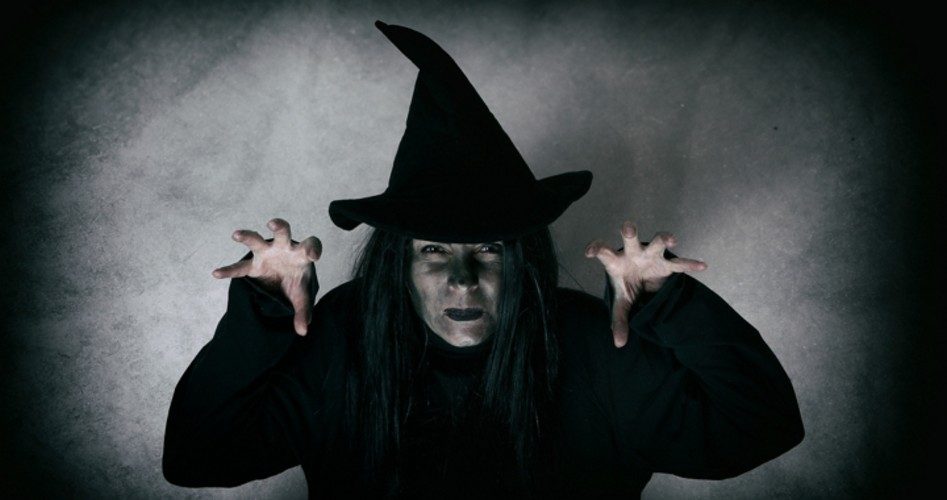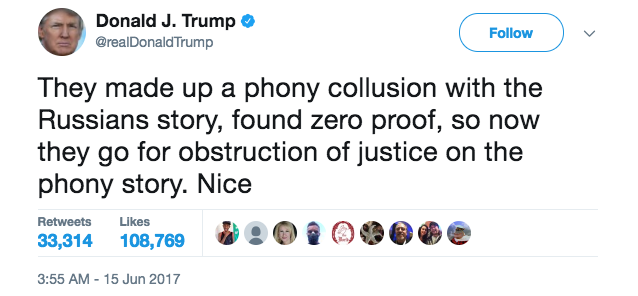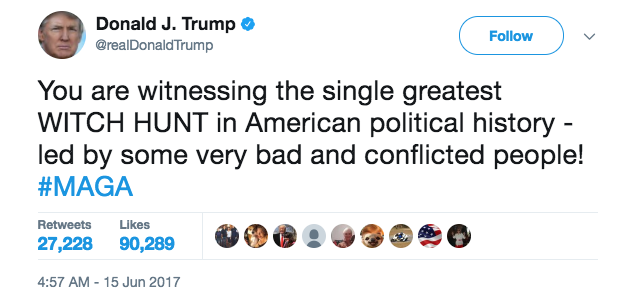
With the report that President Trump is now under investigation by special counsel Robert Mueller for obstruction of justice, Trump took to Twitter in an early morning tweet-rant, describing the investigation as a “witch hunt” and those leading it as “bad and conflicted people.”
The obstruction of justice investigation stems from testimony from ousted FBI Director James Comey, who last week testified before the Senate Intelligence Committee that President Trump told him, “I hope you can see your way clear to letting this go, to letting Flynn go,” according to unnamed sources cited by the Washington Post and NBC News.
Comey testified last week that he leaked his memo of his February 14 Oval Office one-on-one with the president to the media, saying, he hoped it would “prompt the appointment of a special prosecutor.” Of course, given the inconsistencies in his testimony, that statement has to be taken either with a grain of salt or on faith to be accepted at all. At any rate, Mueller was appointed special counsel in the wake of Comey’s firing and subsequent leaking of the memo. And now, because of Comey’s testimony that the president hoped Comey could see his “way clear to letting this go, to letting Flynn go,” Mueller is reportedly investigating whether that was an attempt to obstruct justice.
In the early morning hours of Thursday — the day after the report came out — President Trump tweeted:

And:

One need not be a Trumpeteer to realize the president has a good point about this being a witch hunt. After all, Comey — the man who claims to be responsible for the appointment of the special counsel who is now investigating whether Trump obstructed justice in a separate witch hunt — admitted, under oath, that the president did not direct him to “let Flynn go.” He only said the president hoped for that outcome.
While being questioned by Senator Jim Risch (R-Idaho), Comey was asked about what he claimed — in his prepared statement, in his memo, and in previous oral testimony — the president had said to him in the Oval Office on February 14.
Risch — who, like Comey, is a former prosecuter — asked Comey, “There’s 28 words now in quotes. It says, quote, ‘I hope’ — this is the president speaking — ‘I hope you can see your way clear to letting this go, to letting Flynn go. He is good guy. I hope you can let this go.’ Now, those are his exact words, is that correct?”
After Comey agreed that it was correct, Risch replied:
He said, “I hope.” Now, like me, you probably did hundreds of cases, maybe thousands of cases, charging people with criminal offenses and, of course, you have knowledge of the thousands of cases out there where people have been charged. Do you know of any case where a person has been charged for obstruction of justice or, for that matter, any other criminal offense, where they said or thought they hoped for an outcome?
Comey answered, “I don’t know well enough to answer. The reason I keep saying his words is I took it as a direction,” adding, “I mean, this is a president of the United States with me alone saying ‘I hope this.’ I took it as, this is what he wants me to do. I didn’t obey that, but that’s the way I took it.”
Risch called Comey out, saying, “You may have taken it as a direction but that’s not what he said.” Comey’s one-word reply was, “Correct.”
“Correct.” Trump did not direct, did not order, did not tell Comey to do anything.
And since all of this is based on Comey’s word, his word is worth examining. And when it is examined, it is found wanting. Because weeks before he testified — under oath — that the president said that and that he “took it as direction,” Comey testified — under oath — that in his “experience” at the FBI, he was never “told to stop something for a political reason.”
That happened on May 3, when he was asked by Senator Mazie Hirono (D-Hawaii), “So, if the Attorney General or senior officials at the Department of Justice opposes a specific investigation, can they halt that FBI investigation?” Comey answered, “In theory? Yes.” Hirono followed up with, “Has it happened?” Comey’s answer was, “Not in my experience.” He then clarified by saying:
Because it would be a big deal to tell the FBI to stop doing something that — without an appropriate purpose. I mean, we’re oftentimes — they give us opinions that “we don’t see a case there and so, you ought to stop investing resources in it.” But I’m talking about a situation where we were told to stop something for a political reason. That would be a very big deal. It’s not happened in my experience.
There are three points here — when one unpacks this statement from Comey — that are damning to the argument that the president obstructed justice by telling Comey, “I hope you can see your way clear to letting this go, to letting Flynn go. He is good guy. I hope you can let this go.”
First, Comey’s claim that he took the president’s words in February as a “direction” to drop the investigation are starkly contradicted by his testimony in May that such a thing had “not happened.”
Second, this creates a situation where real doubt exists that Comey’s testimony can be trusted: If he was telling the truth in May, he had to be lying last week; If he was telling the truth last week, he had to be lying in May. Liars are lousy witnesses.
Third, regardless of when — if ever — he was telling the truth, he admitted that an official at the Department of Justice can give an order to drop an investigation because of an opinion that “we don’t see a case there and so, you ought to stop investing resources in it.” The president — it should be remembered — is the head of the executive branch of which the Department of Justice is a part. It stands to reason, then, that the president could — without obstructing justice — order an investigation dropped because he doesn’t see a case there.
Building a case for obstruction of justice against the president, based solely on the testimony of a man who has demonstrably contradicted his own sworn testimony, for allegedly exercising his executive power, in a case that has already been shown to be nonsense, could best be described the way President Trump described it in his tweet: a witch hunt.
Graphic: Thinkstock




